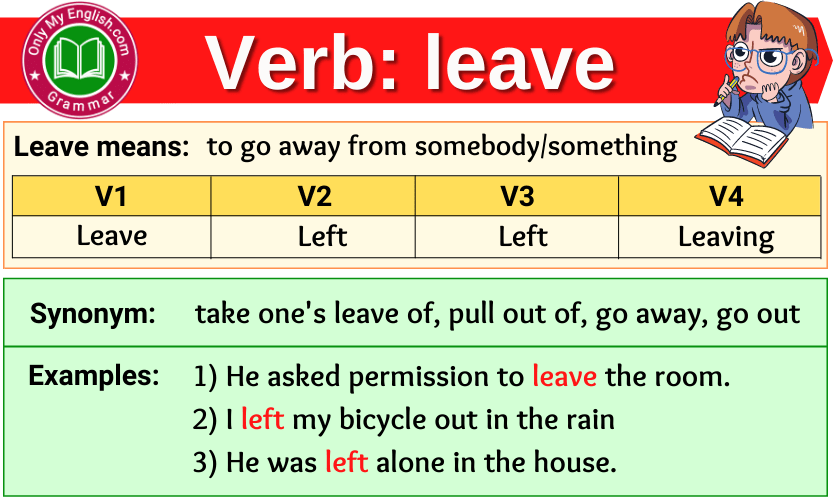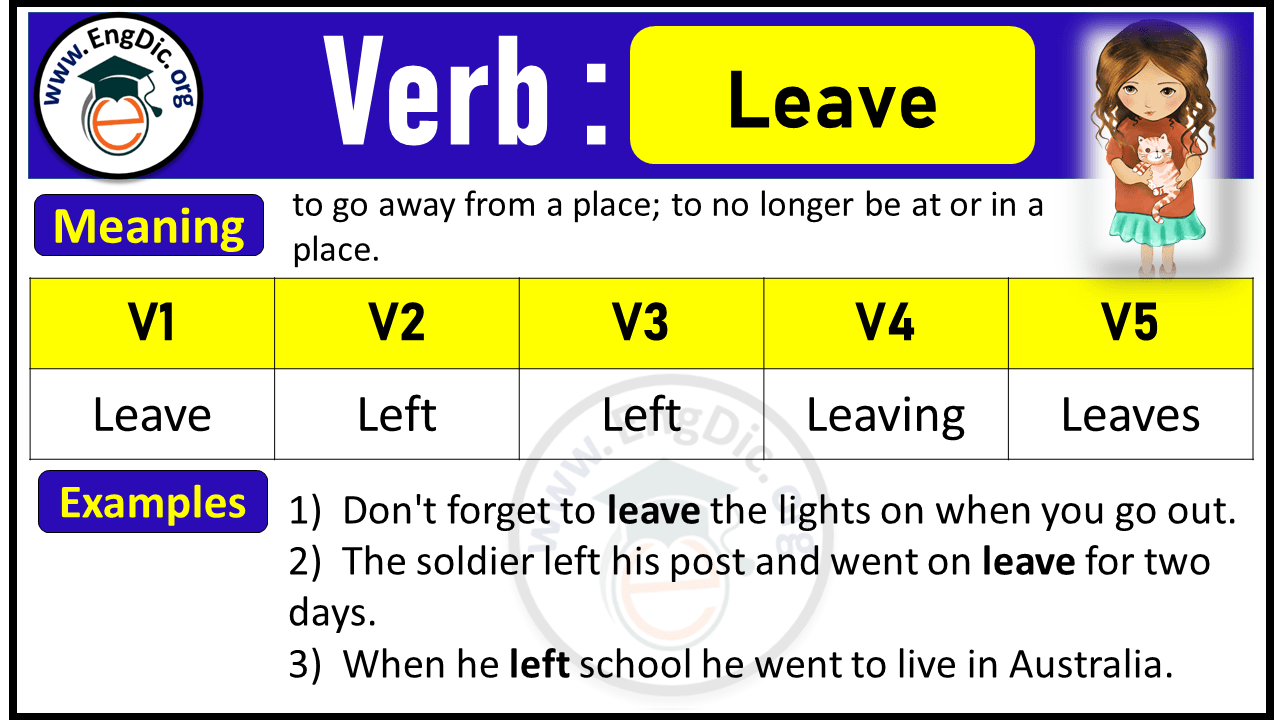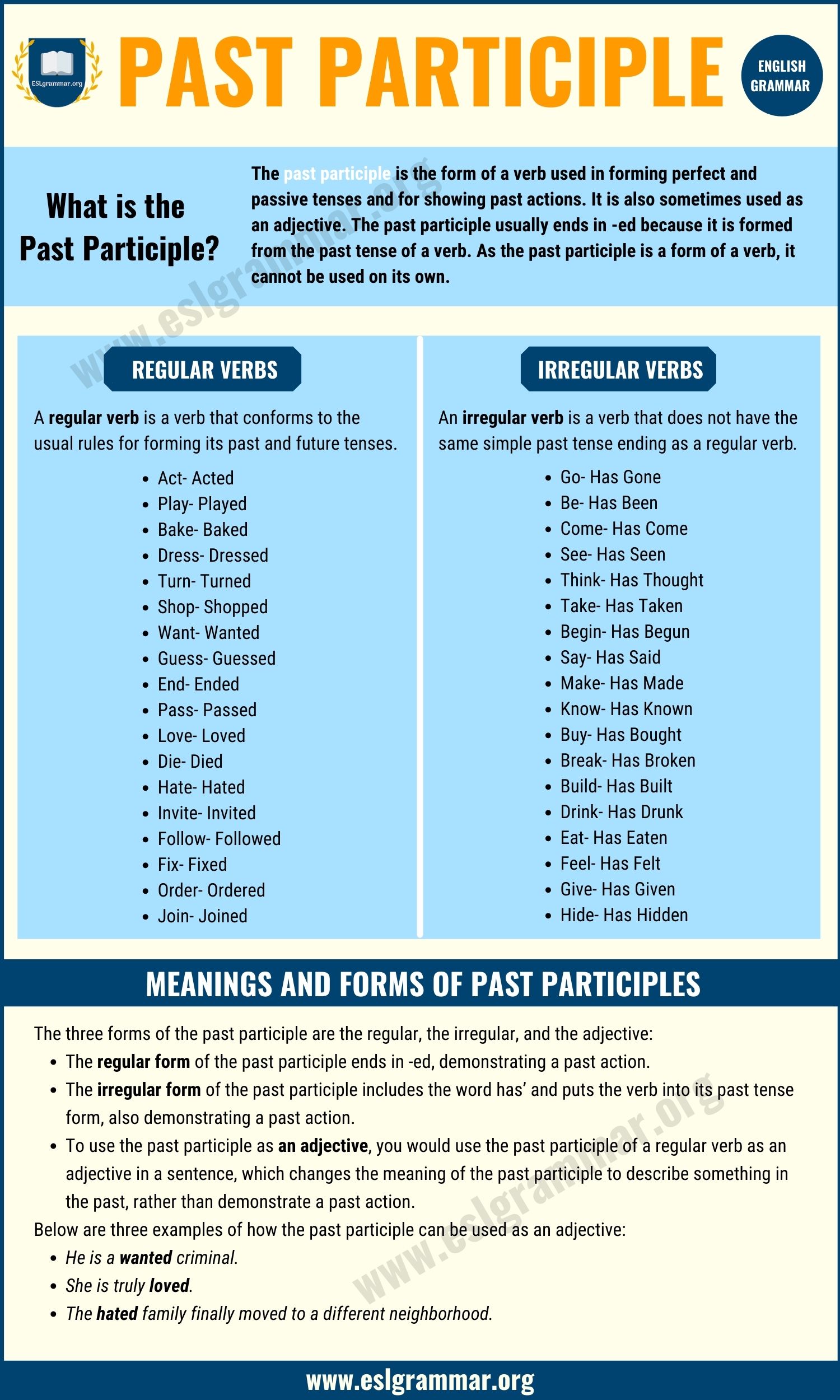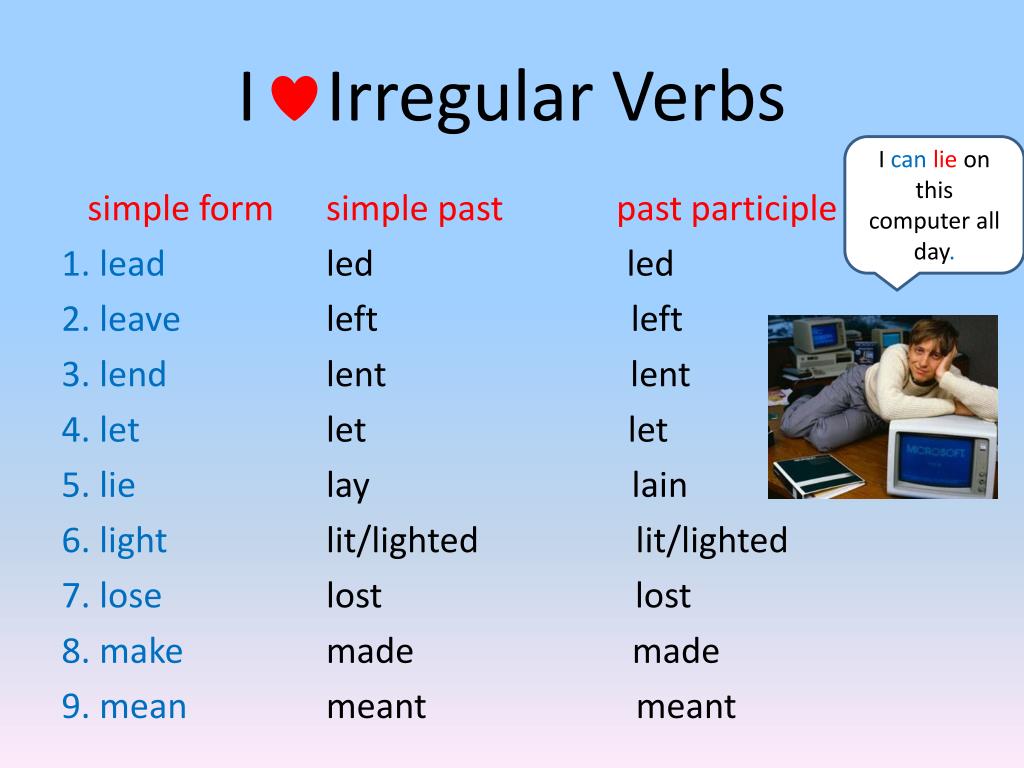
Leave Verb Forms Past Tense, Past Participle & V1V2V3
What is the past participle of "leave"? English Grammar Tenses Past. 1 Answer Diego Martínez Paz Jun 11, 2017 Left. Explanation: Examples:-David had/has left the building.-Nothing was left behind the door. Answer link. Related questions. Is past perfect the same as past participle?.

Past Tense of Leave, Past Participle of Leave, V1 V2 V3 V4 V5 Form of Leave Leave means; Go away
Left is the past tense of the word leave. Left is the past participle of the word leave. leve past form, verb forms, v1v2v3, Infinitive

Leave Past Simple, Past Participle, V1 V2 V3 Form of Leave English Vocabs
Leave Present Participle: Present Participle Form of Leave is Leaving. Example: Sarah is leaving the parcel. Leave 3rd Person Singular: 3rd Person Singular of Leave is Leaves. Example: Sarah leaves the parcel.

Conjugation Leave 🔸 Verb in all tenses and forms Conjugate in past, present and future
Hi there! The past participle is left. Experience - IELTS, OET, CAEL, CELPIP, TOEFL, CAE, FCE, C2, PTE, SAT, DIGITAL SAT, TOEIC, APTIS, GMAT, DUOLINGO. BUSINESS + TRAVEL ENGLISH, from BEGINNER about a year ago. Hi Learners Feel free to sign up with tutors here at Preply and they will help you achieve your learning goals. Best Regards.

List of Past Participle Grammar Syntax
What is the past tense of the word "leave" The past tense (past participle) form of "leave" is "left." The infinitive of the word form is "leave." The present participle form is "leaving." The past tense form is "left" and past participle form is "left." Understanding verb tenses The general grammar rules that govern past tenses are as follows.

Quit Past Simple, Simple Past Tense of Quit, Past Participle, V1 V2 V3 Form Of Quit When
Simple Past Tense He/She/It left. I left. You/We/They left. Past Continuous Tense He/She/It was leaving. I was leaving. You/We/They were leaving. Past Perfect Tense He/She/It had left. I had left. You/We/They had left. Past Perfect Continuous Tense He/She/It had been leaving. I had been leaving. You/We/They had been leaving. Simple Future Tense

Past Participle Definition, Forming Rules and Useful Examples • 7ESL
Table of irregular verbs - English Grammar Today - a reference to written and spoken English grammar and usage - Cambridge Dictionary

Leave past participle EngDic
V3 Past Participle Past Tense of Leave We use the word ' leave ' very often in our daily life. In this lesson, we will examine the details of this widely used expression. If you are ready, let's start! Meaning The meaning of this word is going away from someone or something. Base Form Examples I leave America every year. V2 Past Simple

Leave Verb Forms, Base Form, Past Tense, Past Participle & V1 V2 V3 English Bodh
Updated on August 19, 2019. This page provides example sentences of the verb "leave" in all tenses including active and passive forms, as well as conditional and modal forms. Base Form leave / Past Simple left / Past Participle left / Gerund leaving.

Leave Past Tense Best English Listening Podcast English Made Simple
Conjugate the verb leave in all tenses: present, past, participle, present perfect, gerund, etc.

Leave Past Tense Verb Forms, Conjugate LEAVE
The Verb "Leave" in English Conjugation of "To Leave" The verb "leave" is an irregular verb. (This means that "leave" does not form its simple past tense or its past participle by adding "-ed" or "-d" to the base form.) The Five Forms of "To Leave" "To Leave" in All the Tenses

Past Participle Meanings and Different Forms of Past Participles ESL Grammar
A past participle is a word formed from a verb that can be used as an adjective or to form verb tense. Most past participles end -ed, -d, -t, -en, or -n.. I hope that, when I leave this planet, I will have touched a few people in a positive way. (Actor Will Rothhaar) Forming the Past Participle (Regular Verbs).

Conjugación Leave 🔸 Verbo inglés en todos los tiempos y formas Conjugar en pasado, presente y
Leave Past Simple, Simple Past Tense of Leave, Past Participle, V1 V2 V3 Form Of Leave When learning English you need to know the meaning of certain words first, and then sort the words appropriately according to grammatical rules. Verbs in a regular structure can be transformed with a simple rule, whereas in irregular verbs, this situation is slightly different. It may be a good start to make.

Leave Past Simple, Simple Past Tense of Leave, Past Participle, V1 V2 V3 Form Of Leave When
The past simple and the past participle of leave. Conjugation of the verb leave: Base Form/Infinitive without 'to': leave. Past Simple: left. Past Partciple: left. Present Partciple: leaving. Third Person Singular: leaves. Definition: 1. To go away from. 2. Not to take something or someone with you when you go

Past Tense Of Leave / See Past Simple, Simple Past Tense of See Past Participle The simple
Simple past english left Past participle english left More information Full conjugation of "to leave" Full conjugation of "to leave" Indicative Present I leave you leave he/she/it leaves we leave you leave they leave Present continuous I

Little Moon Leave PresentPastPast Participle TenseVerb Forms YouTube
Past participle left Model : leave Auxiliary : have, be Other forms: leave oneself / not leave Contractions Advertising Indicative Present I leave you leave he/she/it leaves we leave you leave they leave Preterite I left you left he/she/it left we left you left they left Present continuous I am leaving you are leaving he/she/it is leaving